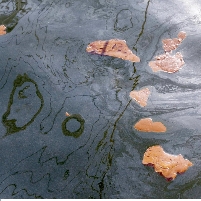Feds Ignored Louisiana Concerns about Experimental Chemicals Used against Oil Slick
Monday, May 17, 2010
 Gulf oil and chemical dispersants (AP Photo/The Houma Courier, Matt Stamey)
Gulf oil and chemical dispersants (AP Photo/The Houma Courier, Matt Stamey)
The federal government approved BP’s use of chemicals to break up the oil from the Deepwater Horizon spill despite concerns from scientists and public officials in Louisiana.
When the U.S. Environmental Protection Agency (EPA) discussed the choice of using chemical dispersants to keep the enormous oil slick from washing up on coastal shorelines, Louisiana’s top environmental people questioned the strategy, insisting there was too much unknown about the impact of the chemicals on aquatic life.
“We’re very disappointed in their approach,” Robert Barham, head of the state’s Department of Wildlife and Fisheries, told the Telegraph. “The federal procedures call for a consensus between federal authorities, the responsible party and the states involved. When we met and expressed our concerns, apparently they decided to go without us.”
Added Alan Levine, head of Louisiana’s Department of Health and Hospitals: “We don’t have any data or evidence behind the use of these chemicals in the water. We’re now basically using one of the richest ecosystems in the world as a laboratory.”
EPA also has come under scrutiny for approving the use of two dispersants that aren’t as highly rated as others for effectiveness or safety. In fact, about a dozen other government-approved dispersants have tested better for breaking up petroleum in water while not causing as much harm to ocean species.
Since the Deepwater Horizon oil platform accident occurred, BP has released 436,000 gallons of the two dispersants, Corexit EC9500A and Corexit EC9527A, into the Gulf of Mexico.
-Noel Brinkerhoff
Oil Spill: BP Accused of Using Gulf of Mexico as 'Toxic Testing-Ground' (by Jacqui Goddard, Telegraph)
In Gulf Oil Spill, How Helpful – or Damaging – Are Dispersants? (by Mark Guarino, Christian Science Monitor)
Louisiana Officials Request Chemical Dispersant Information from BP (Louisiana Environmental Action Network)
BP Oil Spill Cleanup: Is the Solution Now Part of the Problem? (by Noel Brinkerhoff, AllGov)
- Top Stories
- Unusual News
- Where is the Money Going?
- Controversies
- U.S. and the World
- Appointments and Resignations
- Latest News
- Trump Orders ICE and Border Patrol to Kill More Protestors
- Trump Renames National Football League National Trump League
- Trump to Stop Deportations If…
- Trump Denounces World Series
- What If China Invaded the United States?






Comments